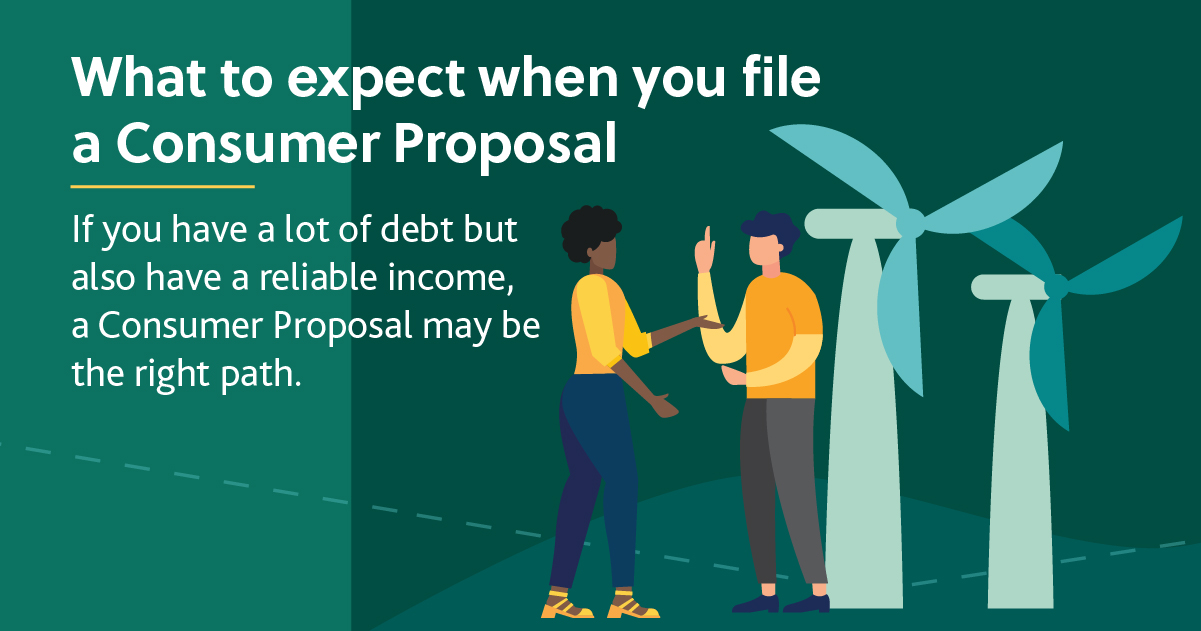Consumer Proposal process
Financial Literacy Month: Part 7 of a 10-part blog series on your financial well-being?
Throughout November, consult this series of blog posts to learn more about your current finances — and how to set yourself on a path to financial freedom.

For people who are struggling with their debt, a Consumer Proposal can be a great option to get their finances back on track. If you have a lot of debt but also have a reliable income for the foreseeable future, a Consumer Proposal may be the right path to return you to a debt-free life.
Let’s look at the full process, from filing a Consumer Proposal until discharge. But first, a quick recap.
Consumer Proposal recap
A Consumer Proposal is a legal process under Canada’s Bankruptcy and Insolvency. Your Licensed Insolvency Trustee will negotiate your debt with your creditors on your behalf and come to an agreement on repaying a portion of what you owe over a set period of time — usually up to five years. Consumer Proposals for 100% debt repayment without fees is also a popular alternative to Bankruptcy.
Consumer Proposal steps
With your financial advisor in your corner, you can expect to go through the following steps on the Consumer Proposal
Step #1 — Free consultation.
Meet with your Licensed Insolvency Trustee, preferably local , for a free session to start your journey through a Consumer Proposal. Together, you’ll review your debts, income, expenses, and assets to come up with a good payment plan. Your trustee will also help you decide which of your assets are exempt from the Proposal under the laws of your province.
Step #2 — Get your Consumer Proposal ready.
After reviewing your unique financial situation with your advisor, they will put together the Proposal. One of the best parts about your Licensed Insolvency Trustee is that they will file all of the necessary paperwork on your behalf. The documents will include a Statement of Affairs, which is a declaration of your income, expenses, and assets — and the Consumer Proposal itself. The Proposal is an offer to your creditors outlining your formal debt repayment plan, which may include paying a portion of your debt over a set amount of time under the oversight of your trustee. At this point, your trustee will also arrange for any action being taken by creditors — like garnished wages — to stop as they prepare to review the Proposal.
Step #3 — Submit the Proposal for review.
Your Licensed Insolvency Trustee will submit the Consumer Proposal to the creditors and they will have 45 days to review the Proposal and vote on whether they accept it or not. If the majority of creditors vote in favour of the Proposal, it is legally accepted and all of the creditors must follow it. The majority is determined by the amount of money owed, not the number of creditors. If they choose to reject your Proposal, a meeting is called to work out an amended Proposal. Whether they vote to accept the first Proposal or an amended one, it is now time to fulfill your duties as outlined by the Proposal you and your trustee put together.
Step #4 — Fulfill your Proposal duties.
Now it’s time to do everything you committed to in your Proposal. Throughout your repayment period, you will make payments to your creditors, lowering your debt each time. These can be monthly payments or lump sums. And if at any time your financial situation changes, you are free to pay down your debt more quickly and move on from the Proposal altogether. You will also be required to attend financial counselling sessions, which will actually give you some great tools as you prepare for a debt-free future. When you finish making your payments, you’ll receive a Certificate of Full Performance and your debt will be gone. Congratulations.
If you want to keep learning about a Consumer Proposal, check out another review of the process.
Consumer Proposal timeline
The full timeline will depend on the findings of your meeting with your Licensed Insolvency. Every financial situation is different. The repayment period will depend on your own income, expenses, assets, and debt. Typically, the timeline of Consumer Proposals lasts anywhere from three months to five years, generally leaning toward the longer repayment period.
Credit score timeline
Your credit will continue to be affected after you have fulfilled the duties of your Consumer Proposal. Once you have finished, the Consumer Proposal will remain on your credit score for up to three years. If you take the maximum 60 months to pay the debt outlined in your proposal, it will affect your credit score for one year after completion. A Consumer Proposal will only affect your credit for a total of 6 years.
The future looks bright
Now it’s time to move on into your future of full financial freedom. Learn from your past experience, the guidance of your Licensed Insolvency Trustee, and the lessons from your financial counselling. Rebuild your credit and keep your finances debt-free. You’ve worked hard and it’s time to move forward with the rest of your life.
For more information about Consumer Proposals, continue your research to decide the best path for you.
Next Blog: Part 8: Benefits of a Consumer Proposal

